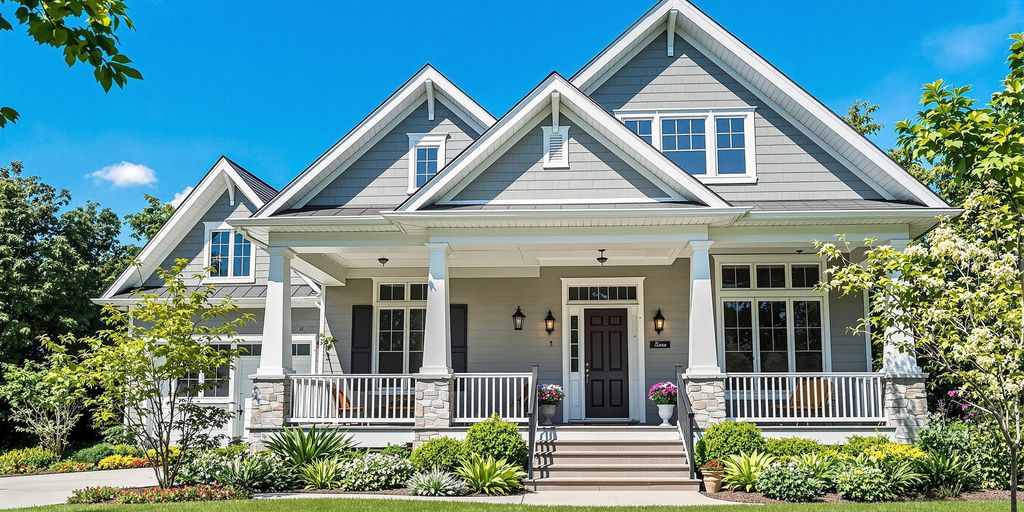Buying a house is a big step, especially as we look toward the housing market in 2025. It’s not just about finding a place to call home; it’s about making smart financial decisions. From understanding what’s happening in the market to getting your finances in order, there’s a lot to consider. Let’s break down the key takeaways to keep in mind as you embark on this journey.
Key Takeaways
- Keep an eye on the housing market trends to understand pricing and demand.
- Make sure your finances are in order, including a good credit score and savings for a down payment.
- Explore different mortgage options and get pre-approved to know your budget.
- List your priorities for a home and research neighborhoods to find the right match.
- Craft a competitive offer and understand the closing process to finalize your purchase.
Understanding the Current Housing Market
Analyzing Home Prices and Trends
So, you’re thinking about buying a house in 2025? Well, buckle up because understanding the housing market is your first big step. Home prices have been on a rollercoaster ride, but recently, things are shifting. Over the next five years, home prices and rents are expected to rise at a slower pace. This could mean a bit of relief for buyers, but it’s still crucial to keep an eye on local trends. Here’s a quick look at what’s happening:
- National Median Price: As of late 2024, the median price for existing homes in the U.S. was around $407,200. That’s up 4% from the previous year.
- Price Variations: Prices can vary significantly depending on the region. Coastal areas might see higher prices compared to inland regions.
- Market Shifts: Analysts predict a gradual shift towards a more balanced market, which could favor buyers slightly more than in recent years.
Evaluating Market Demand and Inventory
Demand and inventory go hand in hand when it comes to buying a home. If you’re wondering if it’s a buyer’s or seller’s market, here’s what you need to know:
- Demand Indicators: About 27.8% of homes sold above their list price in late 2024. This suggests that demand is still quite strong.
- Inventory Levels: The good news for buyers is that inventory has been climbing. There was a 22.5% increase in homes for sale compared to the previous year.
- Local Market Conditions: Always consider the local market conditions. Some areas might have more homes available, giving buyers a better chance to negotiate.
Impact of Interest Rates on Buying
Interest rates are the wild card in the home buying game. They can make or break your budget:
- Current Rates: As of December 2024, the average rate for a 30-year fixed mortgage was 6.69%.
- Rate Trends: The Federal Reserve recently cut its target rate, which might push mortgage rates down further. Keep an eye on these changes as they can affect your monthly payments significantly.
- Future Expectations: While rates might dip slightly, they are still higher than a few years ago. Planning your budget with current rates in mind will help you avoid surprises later.
Understanding these elements will help you make informed decisions when you’re ready to dive into the housing market. Remember, knowledge is power, and being prepared can save you time and money in the long run.
Preparing Your Finances for Home Buying

Assessing Your Financial Readiness
Before jumping into the home-buying process, it’s smart to evaluate your financial situation. Start by asking yourself some key questions: Is your income stable? Have you been paying bills on time? Can you cover the upfront costs? These factors are vital for your financial wellness in homeownership.
- Emergency Fund: Aim to have three to six months’ worth of expenses saved up. This cushion can be a lifesaver if unexpected costs arise.
- Savings for a New Home: Make sure you’ve set aside enough for the down payment and closing costs. Don’t forget about moving expenses, which can add up quickly.
- Credit Score Check: A healthy credit score is crucial. Most lenders require a minimum score of 620 for a conventional mortgage.
Improving Your Credit Score
A strong credit score can open doors to better mortgage rates and terms. Here’s how you can boost it:
- Check Your Credit Reports: Get a report from each of the three major bureaus—Experian, TransUnion, and Equifax. Look for errors and dispute any inaccuracies.
- Pay Down Debt: Lowering your debt-to-income ratio can significantly improve your score. Focus on paying off high-interest credit cards first.
- Avoid New Credit: Try not to open new credit accounts or take on additional debt before applying for a mortgage.
Improving your credit score takes time, but the payoff can be substantial. Lower interest rates can save you thousands over the life of your mortgage.
Saving for a Down Payment
Saving for a down payment is a big step, but it’s one of the most important. Here’s how to get started:
- Set a Savings Goal: Determine how much you need to save based on the price range of homes you’re considering.
- Create a Budget: Factor in not just the down payment, but also other costs like closing fees and moving expenses.
- Automate Savings: Set up automatic transfers to your savings account to ensure you consistently put money aside.
By preparing your finances thoughtfully, you’re setting yourself up for a smoother home-buying experience. Remember, it’s not just about having enough for the down payment—it’s about making sure you’re financially ready for the responsibilities of homeownership.
Navigating the Mortgage Process
Types of Mortgages Available
When you’re getting ready to buy a house, knowing your mortgage options is key. There are several types of mortgages, each with its own perks and downfalls. Here’s a quick rundown:
- Fixed-Rate Mortgage: Your interest rate stays the same for the life of the loan. This is great if you plan to stay in your home for a long time.
- Adjustable-Rate Mortgage (ARM): The interest rate can change after an initial fixed period. It might start lower than a fixed-rate mortgage, but there’s a risk of it going up.
- FHA Loan: Backed by the Federal Housing Administration, these loans are easier to qualify for, especially if you have a lower credit score.
- VA Loan: If you’re a veteran, you might qualify for a VA loan, which often requires no down payment.
Choosing the right mortgage depends on your financial situation and how long you plan to stay in the home.
Getting Pre-Approved for a Loan
Getting pre-approved is a smart move before you start house hunting. It shows sellers you’re serious and financially ready. Here’s what you need to do:
- Gather your financial documents, like pay stubs, tax returns, and bank statements.
- Check your credit score and report to fix any errors.
- Contact lenders to compare their offers and get pre-approved.
A pre-approval letter gives you a clear idea of how much you can borrow, making your home search more focused.
Understanding Mortgage Rates
Mortgage rates can have a big impact on how much you end up paying for your home. Here’s what to keep in mind:
- Shop Around: Don’t settle for the first rate you’re offered. Different lenders offer different rates.
- Rate Locks: Once you find a good rate, you might be able to lock it in, protecting you from increases while you finalize your purchase.
- Economic Indicators: Keep an eye on economic trends, as these can affect rates. Even a small change can make a big difference over the life of the loan.
Getting a good mortgage rate can save you thousands over the life of your loan. Take your time to research and understand your options.
Finding the Right Home for You

Identifying Your Home Needs and Wants
Before you start your house hunt, sit down and make a list of what you truly need in a home. Think about the essentials: the number of bedrooms, bathrooms, and whether you need a big backyard. Then, jot down your wants—things like a modern kitchen or a home office. It’s all about balancing practicality with dreams. Remember, you might not get everything on your wish list, so be ready to compromise.
Exploring Different Neighborhoods
Once you know what you want, it’s time to explore neighborhoods. Drive around, walk the streets, and get a feel for the community vibe. Consider the proximity to work, schools, and amenities. Is it a lively area or a quiet retreat? Each neighborhood has its own charm and quirks, so take your time to find one that feels right.
Attending Open Houses and Tours
Now comes the fun part—touring homes! Attend open houses, and don’t be shy about asking questions. Check out the layout, the condition of the roof, and even the plumbing. Take notes and pictures to help you remember each place. This is your chance to see potential homes up close and personal. If you find a house that ticks most of your boxes, it might just be the one.
Finding the right home is like piecing together a puzzle. Each visit and each neighborhood adds a new piece to the picture of your perfect home. Keep an open mind and enjoy the journey.
If you’re looking for support in buying a house, consider programs like the Choose to Own program (CTO), which can guide you through the process.
Making a Competitive Offer
Crafting a Strong Purchase Offer
Making a strong purchase offer isn’t just about throwing a big number on the table. It’s a mix of strategy, timing, and understanding the seller’s needs. Start by researching the local market conditions to know if you’re in a buyer’s or seller’s market. In a buyer’s market, you might have room to negotiate, but in a seller’s market, your offer needs to be compelling right from the start.
Consider including a personal letter to the seller if it’s appropriate. Sometimes a heartfelt note can make your offer stand out, especially if the seller has an emotional attachment to the home. Also, work with your real estate agent to decide if you should include any contingencies. While they can protect you, waiving some might make your offer more appealing.
Understanding Real Estate Contracts
Real estate contracts can feel overwhelming with all their legal jargon, but understanding them is crucial. These contracts lay out the terms of your offer, including the price, contingencies, and closing date. Make sure you know what each section means and how it affects your purchase.
Here’s a quick breakdown of typical contract components:
- Purchase Price: The amount you’re offering for the home.
- Earnest Money: A deposit showing your serious intent to buy.
- Contingencies: Conditions that must be met for the sale to proceed, like a home inspection or financing approval.
- Closing Date: When you expect to finalize the purchase.
Your agent can help you navigate these terms and ensure your interests are protected.
Negotiating Terms and Conditions
Negotiation is an art, especially in real estate. Once your offer is on the table, be prepared for the seller to counter. This is where knowing your limits is key. Decide beforehand how high you’re willing to go and what terms you’re flexible on.
- Price Negotiation: Be ready to adjust your offer based on the seller’s response.
- Contingency Adjustments: Sometimes removing or altering contingencies can make your offer more attractive.
- Closing Costs: You might negotiate who pays for what in terms of closing costs.
Keep in mind: It’s not just about winning but finding a deal that works for both you and the seller. A good negotiation leaves both parties satisfied.
For more tips and insights on crafting a winning offer, check out this cheat sheet for buying or selling a home in 2025. It’s packed with advice from top real estate agents to help you succeed in a competitive market.
Closing the Deal on Your New Home
Finalizing the Mortgage Agreement
So, you’ve made it this far! Finalizing your mortgage is the big step before you can call that house yours. You’ll need to bring some important stuff to the closing table:
- Proof of identity, like your driver’s license or passport.
- The rest of your down payment. This is usually done through a wire transfer or a cashier’s check.
- Proof of insurance coverage.
Once you’re there, you’ll sign a stack of documents. It might feel like signing your life away, but it’s all part of the process. Depending on where you live, this could mean gathering with everyone involved or signing separately. Either way, once the ink is dry, you’re officially a homeowner!
Conducting a Home Inspection
Before you sign off on everything, a final walk-through is crucial. This is your last chance to make sure everything is as it should be. Check that all agreed-upon repairs have been made, and nothing’s amiss. Bring your home inspection checklist and any repair receipts. If something’s not right, you can still negotiate or delay closing until it is.
Preparing for the Closing Process
Closing day is a mix of excitement and paperwork. Here’s what to expect:
- Review your closing disclosure: Your lender will provide this at least three days before closing. Double-check it against your loan estimate.
- Sign the documents: Carefully review everything you sign. Don’t hesitate to ask questions.
- Get your keys: Before you leave, make sure you have all the keys, codes, and garage openers.
The closing process can feel overwhelming, but remember, you’re just a few signatures away from owning your dream home. Enjoy the moment and get ready to start your new chapter!
Wrapping It Up
So there you have it, a step-by-step guide to buying a house in 2025. It’s a big deal, no doubt about it. From figuring out your budget to finally getting those keys, it’s a journey that takes time, patience, and a bit of know-how. Remember, it’s all about being prepared and making informed choices. Whether you’re a first-time buyer or looking to upgrade, these steps should help you navigate the process with a little more confidence. Good luck on your home-buying adventure, and here’s to finding a place you can truly call home!
Frequently Asked Questions
How long does it take to buy a house?
Buying a house usually takes about 45 to 60 days from start to finish. Being ready with your paperwork and finances can speed things up.
What credit score is needed to buy a house?
You generally need a credit score between 500 and 700 to get a mortgage. The exact score depends on the loan type and the lender.
Is now a good time to buy a house?
It’s a good time if your finances are in order. Having savings, a good credit score, and steady income can make it right for you.
How can I improve my credit score before buying a house?
Pay your bills on time, reduce your debt, and avoid opening new credit accounts to boost your score.
What should I know about mortgage rates?
Mortgage rates can change, so it’s smart to shop around and compare rates from different lenders to find the best deal.
What’s the first step in buying a house?
Start by checking your credit score and getting pre-approved for a mortgage to know how much you can afford.


